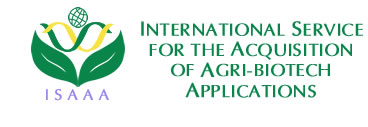ISAAA Statement on Public Awareness, Education and Communication
4-17 December 2016: 8th meeting of the Conference of the Parties serving as the meeting of the Parties to the Cartagena Protocol on Biosafety (COP-MOP 8), Cancun, Mexico.
Thank you Madam Chair
I speak on behalf of the International Service for the Acquisition of Agribiotech Applications (ISAAA).
ISAAA facilitates knowledge sharing on all aspects of crop biotechnology and Biosafety, especially in developing countries. This helps small family farmers to make informed choices on this beneficial technology. In the light of climate change, growing global population and the need for sustainable utilisation of biodiversity, this is crucial.
As an organisation that strongly advocates dissemination of science and evidence-based information, we are concerned about the joint collaboration between Aarhus Convention and the Cartagena Protocol on Biosafety in creating public awareness, education and communication on LMOs. Why?
Madam Chair, the Aarhus Convention is Europe-led and recently (June 2016), the European Union Parliament endorsed a report (Heubuch - A8-0169/2016 report) urging G7 members not to support GMO crops in Africa. This goes against the spirit of Article 16 and 19 of the CBD that obligates Parties to engage in biotechnology transfer. We are concerned therefore that public awareness spearheaded by Europe will not be impartial, and may derail ongoing efforts to improve sustainability and food security through modern biotechnology. In addition, the joint collaboration between Aarhus Convention and Cartagena Protocol might not be in favour especially of the Asian and African regions, which have different needs in terms of food security and biodiversity conservation compared to European countries.
Madam Chair, we strongly recommend that public awareness and communication should be backed by scientific data and evidence accumulated over the years, not on imaginary risks and ideological fantasies or hypothesis. Together with the Public Research and Regulation Initiative (PRRI), we represent a big pool of scientists from various backgrounds on modern biotechnology and biosafety and are open to partnerships interested in communicating scientifically verified information in these fields.
Thank you Madam Chair.


